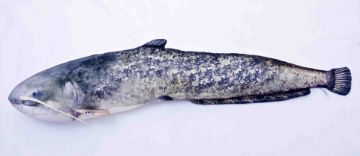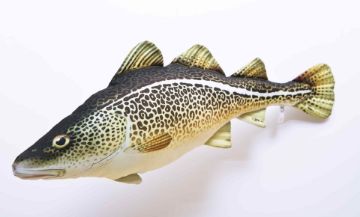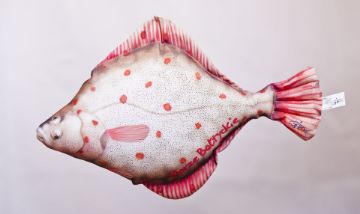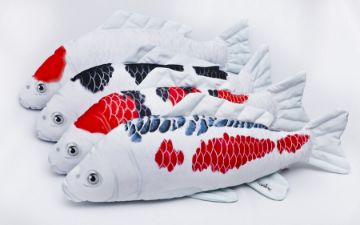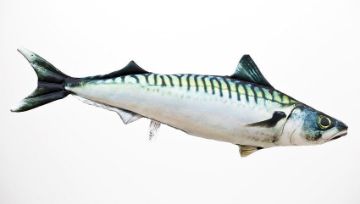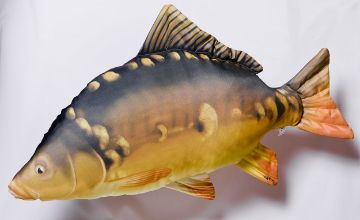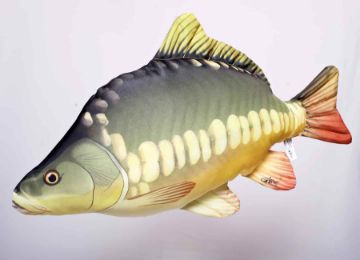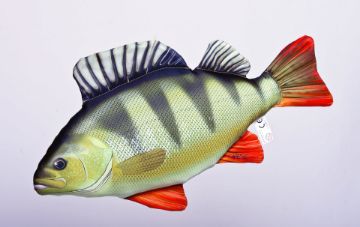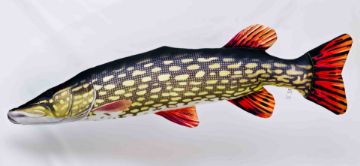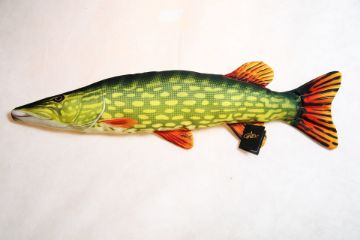Gaby Pillows
Gaby Fish Pillows
Gaby Pillows Bass Regular
GP175198
Dicentrarchus Labrax
70cm
The European Sea Bass (Dicentrarchus Labrax) is a predatory saltwater fish from the Perciformes order. It is present in most coastal waters of the North Atlantic , the Mediterranean, the North Sea as well as the Black Sea. They are found sporadically in brackish waters of river estuaries. Sea Bass often form shoals when hunting and adult specimens feed primarily on invertebrates and small fish as sardines and herring. The species is highly prized by saltwater anglers and is a favorite of chefs around the world.
£22.99
Gaby Pillows Blue Fin Tuna Regular
GP175518
Thunnus Thynnus
66cm/160cm
The bluefin tuna is a large migratory fish of the mackerel family (Scombridae). It is native to the waters of the western and eastern Atlantic Ocean, as well as the Mediterranean Sea. Record specimens can exceed 900kg in weight and reach some 4 meters in length. It is characterized by its fusiform and ideally aerodynamic shape, as well as having the most advanced thermoregulation system of all bony fish. As all tuna, the bluefin is an excellent hunter, feeding mainly on small fish and squid. Globally, the bluefin is at risk of extinction and is currently one of the most threatened fish species.
£22.50
Gaby Pillows Brown Trout Regular
GP1750013
The Brown Trout
Salmo Trutta M Fario
62cm
The Brown Trout (salmo trutta morpha fario ) is a species of salmonid. Its natural habitat is cold and fresh water. It originally inhabited almost all of Europe and was present in small numbers in Asia. It has, however, has been introduced to every continent except Antarctica. The colouring of the Brown Trout varies considerably depending on its surrounding, but in general, it has black and red spots against a yellow-white or yellowish body colour. As a predatory fish, it feeds on small water animals, insects and small fish. Recent years have seen a drastic decline in Brown Trout populations. Causes have been manifold but underline the species’ vulnerability. Conservation of natural and original habitats, along with assistance in natural reproduction of this species could be its only rescue.
£16.99
Gaby Pillows Catfish Giant
GP175167
Silurus Glanis
115cm/200cm
A member of the catfish family, the Wels is the largest freshwater predatory fish in Europe. It’s prime habitat are warm, slow- flowing waters in central, southern and eastern Europe and is present in brackish waters of the basins of the Baltic, Caspian and Black Seas. A true giant, it can reach more than two meters in length and can weigh more than 100kg. The Wels is a mostly nocturnal fish, feeding primarily on fish and other live prey. The species has a specific body shape, smooth skin and long “whiskers” or barbels which are used to locate food. It is a popular gamefish, renowned for its cunning and strength.
£33.99
Gaby Pillows Clown Fish Mini
GP175532
Amphiprion Ocellaris
32cm/56cm
The Ocellaris Clownfish (Amphiprion ocellaris) is a small marine fish, recognizable by its characteristic color pattern. It is endemic to the shallow reefs of the East Indian and Western Pacific Oceans. Clownfish live in symbiosis with anemones, whose arms can be deadly to other fish. The reproductive cycle of the clownfish is linked to the moon’s phases and can see the clownfish reproduce several times a year. The species feeds mainly on algaes and plankton as well as food particles left behind by its anemone host. It is a very popular saltwater aquarium fish.
£13.99
Gaby Pillows Clown Fish Regular
GP175549
Amphiprion Ocellaris
32cm/56cm
The Ocellaris Clownfish (Amphiprion ocellaris) is a small marine fish, recognizable by its characteristic color pattern. It is endemic to the shallow reefs of the East Indian and Western Pacific Oceans. Clownfish live in symbiosis with anemones, whose arms can be deadly to other fish. The reproductive cycle of the clownfish is linked to the moon’s phases and can see the clownfish reproduce several times a year. The species feeds mainly on algaes and plankton as well as food particles left behind by its anemone host. It is a very popular saltwater aquarium fish.
£21.99
Gaby Pillows Cod Regular
GP175075
Gadus Morhua
38cm/75cm
The Atlantic Cod (Gadus Morhua) is a predatory saltwater fish present in the Northern Atlantic Ocean as well as the seas of northern Europe, including the Baltic. It is a schooling fish which lives in deep water. Cod and members of their family feed mainly on small marine organism, especially small fish. It features a characteristics color pattern along its side. Cod is an important economic part of the fisheries of northern Europe, though continued pressure on its populations has seen stocks dwindle in the past decades. It, nonetheless, remains a highly prized fish by anglers.
£22.50
Gaby Pillows Crab
GP175754
Cancer pagurus
60cm
Crabs – A group of crustaceans consisting of nearly 7 thousand species. Crabs have a characteristic body shape with a thick exoskeleton. Many crabs, like the ones in our collection, are relatively agile and fast swimmers, able to move in all directions. They are found in all of the world’s oceans, in fresh water and even on land. Their diets vary but in general they feed on plant and animal material found on the bottom of bodies of water. They are an important part of the fishing industries of several countries and are prized for their pleasant taste.
£22.99
Gaby Pillows Dolphin Giant
GP175365
The Bottlenose Dolphin
Tursiops
55cm/125cm
Bottlenose Dolphin perhaps the most recognizable of all the whales and dolphins, the Bottlenose Dolphin (Tursiops) is the most widespread of all the 44 dolphin species. It is found in nearly all tropical and moderate waters around the globe. It feeds on fish, crustaceans and molluscs. The species has a characteristic smiling mouth and bottle shaped rostrum. Bottlenose Dolphins are very intelligent animals and can communicate through various sounds (verbal language) and body language. It is a friendly and inquisitive species and often spends time with other dolphin species, whales and even sharks.
£32.99
Gaby Pillows Flounder Regular
GP175099
Platichthys Flesus
41cm
Flounder are a group of flatfish species (Pleuronectidae). Representatives of this family of fish in the Baltic Sea include, among others, the Plaice, Flounder and Dab. They are a demersal fish, giving them their characteristic flat body shape and one-sided appearance. This fish can mask itself on the sea floor perfectly – thanks to the ability to change coloration and dig itself into the sand. Flounder are nocturnal predators, feeding mainly on small sea organisms during the night while resting buried in the sand during the day. The Flounder is invariably associated with the waters of the Baltic Sea, where they constitute a very important part of fisheries management and are part of the region’s culture and history.
£13.99
Gaby Pillows Grass Carp Giant
GP175358
The Grass Carp
Ctenopharyngodon idella
40cm/75cm/105cm
The Amur or Grass Carp (Ctenopharyngodon idella) is a large member of the carp family. It is native to the waters of China and the Amur river basin. Growing to a maximum of 1,5m in length, the species prefers warm slow flowing waters or lakes. It feeds mainly on aquatic vegetation. It was introduced to Europe in the middle of the 20th century, where it adapted very well. It is a very hearty, strong and streamlined fish, making it popular amongst fish farmers and anglers alike.
£30.99
Gaby Pillows Grass Carp Regular
GP175341
The Grass Carp
Ctenopharyngodon idella
40cm/75cm/105cm
The Amur or Grass Carp (Ctenopharyngodon idella) is a large member of the carp family. It is native to the waters of China and the Amur river basin. Growing to a maximum of 1,5m in length, the species prefers warm slow flowing waters or lakes. It feeds mainly on aquatic vegetation. It was introduced to Europe in the middle of the 20th century, where it adapted very well. It is a very hearty, strong and streamlined fish, making it popular amongst fish farmers and anglers alike.
£21.99
Gaby Pillows Great White Shark Giant
GP175761
Perhaps the most well-known and recognized species of shark, the Great White, or White Pointer, inhabits the majority of the temperate waters of the world’s oceans and seas. It has a typical predatory body shape, characterized by its aerodynamic and muscular build and a mouth studded by rows of teeth which are constantly replaced. The Great White can grow to some 7 meters in lenght (around 24 feet), and is a viviparous species, giving birth to several live young individuals. It feeds primarily on fish as a juvenile and mainly on small (and not so small) marine mammals as an adult.
£33.49
Gaby Pillows Killer Whale
GP175778
Product Description
What better alternative to the teddy bear or similar plush animal than a cuddly Killer Whale?
The Orca, is a well-known marine animal with its beautiful colours. This cuddly toy is a nice gift idea, not only for the next generation of anglers!
Length: approx 118cm
£36.99
Gaby Pillows Koi Carp Regular
GP175181
Nishiki-Goi
60cm
Koi Carp ((錦鯉 nishikigoi ) are a domesticated and genetically selected form of the Common Carp (Cyprinus Carpio). Hailing from Japan, koi were first bred in the 1820’s in the town of Ojiya. Koi carp sport characteristic coloration that make them a popular pond and decorative fish. There are more than 120 different types of Koi worldwide, varying in color and shape. Of these, the most popular varieties are the Tancho, Shusui, Asagi, Sanke and Utsuri.
£21.99
Gaby Pillows Mackerel Regular
GP175174
Scomber Scombrus
60cm
The Atlantic Mackerel (Scomber scombrus) is a pelagic fish of the mackerel family. It inhabits most coastal waters along the northern United States, the European Atlantic coast, the Meditterranean and Black Seas as well as the north-west Baltic. Adult specimens can reach some 50cm in length and weigh up to 1 kg. Mackerel are nomadic fish and live in large schools. They feed mainly on small crustaceans, plankton, snails and small fish. Aside from being a popular gamefish, the Atlantic Mackerel is an important economic driver of many national fishing industries, thanks to its high yield and long history of commercialization. It is prized for its taste and high concentrations of Omega-3 fatty acids and vitamin B12.
£20.99
Gaby Pillows Mirror Carp Giant
GP175471
Cyprinus Carpio
90cm
It’s a very popular fish of the carp species. Originally it has inhabited the catchment area of the Caspian, the Aral and the Black Seas. The Carp has become a famous breeding sh after its domestication in China in 5th century b.C. The Carp has gained a lot of variations, from full-scaled species to species without any scales. It prefers calm and warm waters. It feeds insects’ larvas, molluscs and shellsh. Recently the Carp has become an icon of sport shing because of its bravery and strength. The Carp enjoys popularity among the anglers from all over the world.
£33.99
Gaby Pillows Mirror Carp Regular
GP175044
Cyprinus Carpio
61cm
It’s a very popular fish of the carp species. Originally it has inhabited the catchment area of the Caspian, the Aral and the Black Seas. The Carp has become a famous breeding sh after its domestication in China in 5th century b.C. The Carp has gained a lot of variations, from full-scaled species to species without any scales. It prefers calm and warm waters. It feeds insects’ larvas, molluscs and shellsh. Recently the Carp has become an icon of sport shing because of its bravery and strength. The Carp enjoys popularity among the anglers from all over the world.
£21.99
Gaby Pillows Perch Regular
GP175051
Perca Fluviatilis
50cm
The Common Perch is a popular species of the genus Perca (the perches). It inhabits most Europe waters and is present in parts of Asia. It has also been successfully introduced into Australian reservoirs. The Perch distinguishes itself by its beautiful coloring of characteristic dark veritcal stripes on the body, bright red fins and dorsal fin with spines. Juvenile perches feed mainly on plankton, invertebrates and fish roe while older specimens become typical predators, often hunting in packs for small fish. It is a very highly sought after fish by anglers and puts up quite a fight.
£21.99
Gaby Pillows Pike Giant
GP175006
The Giant Pike
Esox Lucius
115cm/200cm
The Northern Pike is a species of carnivorous fish of the genus Esox (the pike family, along with musky and North American pickerel). It inhabits almost every freshwater in the world and some coastal areas of seas. It exhibits the typical features of an ambush predator; a long body shape and camouflage colouring. The Pike feeds mainly on fish and small aquatic animals and birds. It is very sporting and highly sought after fish knows for its extravagant lunges and jumps. It is, nonetheless, a very sensitive species and reacts negatively to changes in the environment.
£32.75
Gaby Pillows Pike Regular
GP175037
Esox Lucius
80cm
The Northern Pike is a species of carnivorous fish of the genus Esox (the pike family, along with musky and North American pickerel). It inhabits almost every freshwater in the world and some coastal areas of seas. It exhibits the typical features of an ambush predator; a long body shape and camouflage colouring. The Pike feeds mainly on fish and small aquatic animals and birds. It is very sporting and highly sought after fish knows for its extravagant lunges and jumps. It is, nonetheless, a very sensitive species and reacts negatively to changes in the environment.
£23.50
Gaby Pillows Pink Dolphin Giant
GP175792
The Bottlenose Dolphin
Tursiops
55cm/125cm
Bottlenose Dolphin perhaps the most recognizable of all the whales and dolphins, the Bottlenose Dolphin (Tursiops) is the most widespread of all the 44 dolphin species. It is found in nearly all tropical and moderate waters around the globe. It feeds on fish, crustaceans and molluscs. The species has a characteristic smiling mouth and bottle shaped rostrum. Bottlenose Dolphins are very intelligent animals and can communicate through various sounds (verbal language) and body language. It is a friendly and inquisitive species and often spends time with other dolphin species, whales and even sharks.
£37.99
Gaby Pillows Rainbow Trout Regular
GP175020
The Rainbow Trout
Oncorhynchus Mykiss
62cm
The Rainbow Trout (oncorhynchus mykiss) originates from North America. However, thanks to its high status in cuisine and angling, it has been introduced to many areas around the world. The most characteristic feature is its colouring, comprising of numerous spots against a bright ‘rainbow’ stripe which runs the length of the body and from which the species derives its name. Without doubt,the Rainbow Trout is one of the most beautiful and most sporting fish targetted by today’s anglers. Like other trouts it feeds on small water animals, insects and small fish. It is also a species which adapts very easily to new environments.
£23.50
- 1
- 2
.png)



